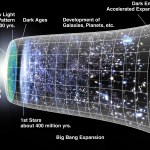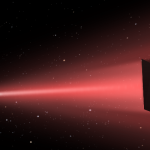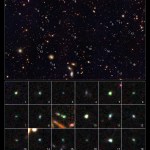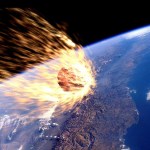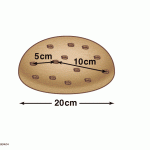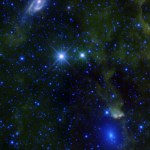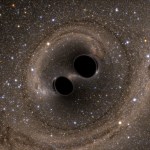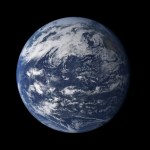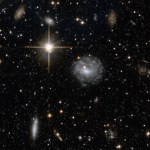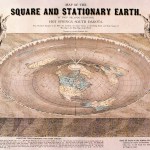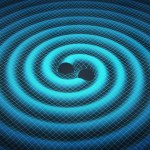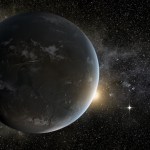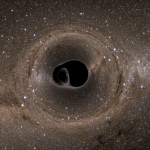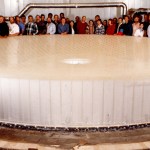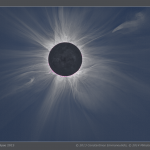
"Even if I stumble on to the absolute truth of any aspect of the universe, I will not realise my luck and instead will spend my life trying to find flaws in this understanding - such is the role of a scientist." -Brian Schmidt
One of the biggest surprises in our understanding of the Universe came at the end of the 20th century, when we discovered that the Universe wasn't just expanding, but that the expansion was accelerating. That means the fate of our Universe is a cold, lonely and isolated one, but it's a fate that we wouldn't have uncovered if we were born when the Universe was just half…
"Greatness is not in were we stand, but in what direction we are moving. We must sail sometimes with the wind, and sometimes against it - but sail we must. And not drift, nor lie at anchor." –Oliver Wendell Holmes
It's long been a dream of humanity to travel interplanetary distances at great speeds, or to make it to another star system within a human lifetime. Until recently, technologies to get us there -- antimatter propulsion, wormholes or warp drive -- have all been composed of physically unrealistic solutions. But recent developments in laser technology make directed energy propulsion a…
"The wonder is, not that the field of stars of so vast, but that man has measured it." -Anatole France
If you could gather 250 million times as much light as your eye, and improve your resolution by several orders of magnitude, you just might be able to see what the Hubble Space Telescope can. By extending down into the near-infrared, and combining those observations with that from other great observatories like Chandra and Spitzer, we can probe the star-formation history of the Universe.
Image credit: NASA, ESA, the GOODS Team and M. Giavalisco (STScI/University of Massachusetts), of a…
"Here's an analogy. The Universe is expanding the way your mind is expanding. It's not expanding into anything; you're just getting less dense." -Katie Mack
Excitement about the Universe in general -- and gravitational waves in particular -- is still peaking here at Starts With A Bang. Did you catch everything we covered this past week? Here's what you may have missed:
What makes a theory a scientific one? (for Ask Ethan),
The most astounding picture of stars beyond our galaxy (for Mostly Mute Monday),
Could aliens see heat-based signs of life on Earth?…
“You asked me how to get out of the finite dimensions when I feel like it. I certainly don't use logic when I do it. Logic's the first thing you have to get rid of.” -J.D. Salinger
Now that gravitational waves have been verified to exist, and the first black hole-black hole merger has been definitively detected by LIGO, it's time to start thinking of the next steps in gravitational wave astronomy. The biggest one we can dream of, perhaps the holy grail of this field of study, is to go beyond General Relativity itself, and to find evidence that gravitation is a truly quantum theory at its core…
"Mathematicians deal with possible worlds, with an infinite number of logically consistent systems. Observers explore the one particular world we inhabit. Between the two stands the theorist. He studies possible worlds but only those which are compatible with the information furnished by observers. In other words, theory attempts to segregate the minimum number of possible worlds which must include the actual world we inhabit." -Edwin Hubble
The combined work of many 20th century astronomers and physicists -- including Einstein, Slipher, Leavitt and Hubble -- led to the conclusion…
"Vision is the art of seeing what is invisible to others." -Jonathan Swift
If you want to look out into the Universe, all you need to do is gather the light it gives off. Unless, of course, there's something in the way. For about 20% of the sky, that's exactly the story for our own Milky Way galaxy, where the neutral gas and dust block most of the visible light everywhere we look, preventing us from observing the Universe beyond.
Image credit: ESO/B.Tafreshi, of the Milky way in visible light as seen from Earth.
However, this doesn't mean we have no options: the gas and dust might block…
“If the imprint is really due to gravitational waves from the big bang, then this is the type of cosmological discovery that comes along perhaps once every fifty years.” -Kip Thorne
Now that LIGO's successfully detected it's first gravitational waves — from two merging black holes — we know that we will find them in a variety of circumstances if we look in the right way.
Illustration of a fast gamma-ray burst, previously only thought to occur from the merger of neutron stars. Image credit: ESO.
While LIGO and its successors will be great for exploring high-frequency events like small black…
"There was a long history of speculation that in quantum gravity, unlike Einstein's classical theory, it might be possible for the topology of spacetime to change." -Edward Witten
General relativity makes very specific prediction for what the curvature of space should be at the event horizon of a black hole, and for the consequences to spacetime are for a mass accelerating outside, near and through it. However, a fully quantum theory of gravity is needed to understand what happens at or near a black hole's singularity.
Image Credit: Caltech/MIT/LIGO Lab, of the first gravitational wave…
“The world communicates subtly. Most people don't hear or see the signs because they're so wrapped up in their day-to-day lives.” -Doug Cooper
If you wanted to see if a planet was inhabited in Star Trek, all you had to do was scan for signs of life. With current technology, that's really hard to do! We rely on cues from all across the electromagnetic spectrum to identify biosignatures, such as analyzing the atmosphere, land and oceans for molecular signatures.
This image from Sentinel-2A shows how Saudi Arabia’s desert is being used for agriculture. The circles come from a central-pivot…
"We are stardust, we are golden,
We are billion year old carbon,
And we got to get ourselves back to the garden." -Crosby, Stills, Nash & Young
When Charles Messier first began cataloguing nebulae, even globular clusters, just a few tens of thousands of light years distant, weren’t resolvable into individual stars. But thanks to the Hubble Space Telescope, we can see individual stars in other galaxies many millions of light years away.
Image credit: NASA, ESA and T.M. Brown (STScI), of background galaxies seen through the disk of Andromeda.
In a series of images taken from 2004-…
“Where there is an observatory and a telescope, we expect that any eyes will see new worlds at once.” -Henry David Thoreau
Oh, let's be real. While there was plenty to talk about here at Starts With A Bang, there was one thing that took over the news from everything else, the first ever discovery of gravitational waves! Sure, there were plenty of other remarkable stories, including:
Are we due for an extinction event on Earth? (for Ask Ethan),
Why do telescopes have holes in the middle? (for Mostly Mute Monday),
What will it mean if LIGO detects gravitational…
"I cannot help fearing that men may reach a point where they look on every new theory as a danger, every innovation as a toilsome trouble, every social advance as a first step toward revolution, and that they may absolutely refuse to move at all." -Alexis de Tocqueville
You don’t need to be right to be a scientist, and your theory doesn’t need to be correct to be a scientific theory. While there is a big difference between the way we colloquially use the word theory (to mean “idea”) and the way scientists use it (to mean “testable idea”), there are actually three different stages…
“Look, there's no metaphysics on earth like chocolates.” -Fernando Pessoa
One of the most iconic associations with Valentine's Day is chocolate. And not just any chocolate, mind you, but good-quality chocolate, with a creamy, silky-smooth texture, a firm but shiny structure, and an even, rich consistency and taste throughout.
Image credit: Moyan Brenn of flickr, under c.c.-by-2.0, via https://www.flickr.com/photos/aigle_dore/8994313260.
Perhaps surprisingly, there's a rich and complex science behind it. Chocolate can come in six different crystalline structures, and by properly controlling…
"Ladies and gentlemen, we have detected gravitational waves." -David Reitze
More than 100 years after Einstein's relativity came out, one of its last great predictions -- the existence of gravitational radiation -- has been directly experimentally confirmed! The LIGO collaboration has observed two ~30 solar mass black holes merging together, producing a slightly less massive final black hole as three sun's worth of mass was converted into energy via Einstein's E = mc^2.
Image credit: R. Hurt – Caltech/JPL.
This type of event, although quite serendipitous for the LIGO collaboration, is…
"We stand on a great threshold in the human history of space exploration. If life is prevalent in our neighborhood of the galaxy, it is within our resources and technological reach to be the first generation in human history to finally cross this threshold, and to learn if there is life of any kind beyond Earth." -Sara Seager
25 years ago, there were no planets known around Sun-like stars other than our own. Just 5 years ago, there were no rocky planets known around Sun-like stars other than our own. And today, we don't have any direct images of those rocky worlds potentially suitable…
"Einstein's gravitational theory, which is said to be the greatest single achievement of theoretical physics, resulted in beautiful relations connecting gravitational phenomena with the geometry of space; this was an exciting idea." -Richard Feynman
When we look out into the Universe, we normally gain information about it by gathering light of various wavelengths. However, there are other possibilities for astronomy, including by looking for the neutrinos emitted by astrophysical sources -- first detected in the supernova explosion of 1987 -- and in the gravitational waves emitted by…
"A mouse does not rely on just one hole." -Plautus
When you look at the largest, most powerful optical telescopes in the world, they all have something in common: they all have holes in their central, primary mirrors. This is for a few reasons, including that they're all reflectors, they all need to focus light somewhere in front of the mirror, and they all need to send that light somewhere to be recorded and analyzed.
Image credit: Wikimedia Commons user Eudjinnius, of a diagram of Herschel-Lomonosov telescope system.
You can, in principle, focus the light somewhere off-axis, and…
“Where there is an observatory and a telescope, we expect that any eyes will see new worlds at once.” -Henry David Thoreau
With more stories of the Universe having been told this past week at Starts With A Bang, it's always a thrill to look back, see what we've covered and see what thoughts and ideas they've inspired in you. In the unlikely event you missed any of them, here's what we talked about:
The Multiverse and the road less traveled (for Ask Ethan),
How to catch a speeding star (for Mostly Mute Monday),
Why does blowing on your hot drink cool it down?,
The…
"Biological diversity is messy. It walks, it crawls, it swims, it swoops, it buzzes. But extinction is silent, and it has no voice other than our own." -Paul Hawken
Looking at the history of life on Earth, the fossil record shows something incontrovertible: in order for new forms of life to rise to dominance, it requires something to knock the prior forms from dominating their ecological niche. This can come about in any number of ways, but the most striking changes come from catastrophic events that wipe a large percentage of species off the Earth at once: a mass extinction event.
Image…
